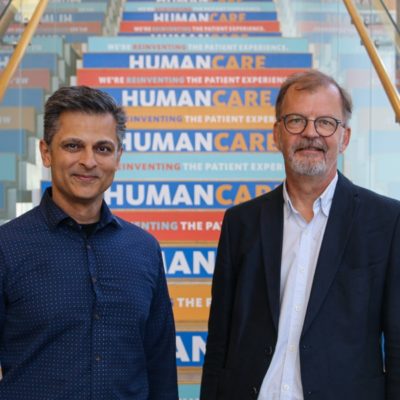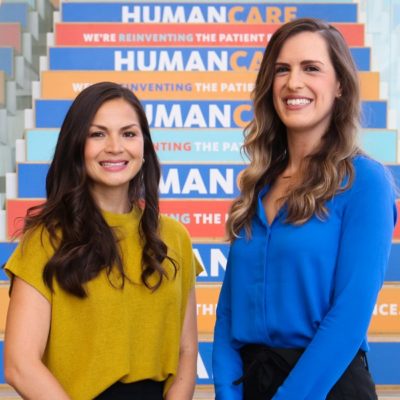On November 16th, St. Michael’s Foundation aired its 8th annual medical research competition, Angels Den, and awarded St. Michael’s Hospital teams $500,000 to fund their research.
“Angels Den has provided critical seed funding to launch several homegrown innovations that promise to revolutionize areas of medicine,” said Dr. Ori Rotstein, Vice President, Research and Innovation, at St. Michael’s Hospital. “It’s the catalyst for getting early-stage research projects by some of the best minds in medicine off the ground.”
During the hour-long virtual event that streamed on angelsden.ca, six teams of scientists pitched their research ideas to a panel of celebrity judges and more than 60 jurors for a chance to win the Keenan Award for Medical Discovery or the Odette Award for Health System Innovation, each valued at $150,000. A third award, the $100,000 Canada Life People’s Choice Award, was handed out to the team that received the most viewer votes. The four finalists that did not win either the Keenan Award or the Odette Award were awarded $25,000 for their projects.
Here are the winners.
The Keenan Award for Medical Discovery funds novel therapies, better diagnostics, vaccines or medical devices that will improve patients’ lives.
Winner – Suctioning Stones for Clean Kidneys
- Monica Farcas, Investigator, Li Ka Shing Knowledge Institute, Surgeon-Entrepreneur, Urologist, St. Michael’s Hospital.
- The Challenge: The pain of kidney stones is excruciating and 10 percent of adults have an attack in their lifetime. While surgeons can remove kidney stones by breaking them with lasers, the process leaves tiny fragments, like sand, that can create new stones over time. With too many recurrences, people can lose their kidney function altogether.
- The Solution: Monica Farcas has invented a device that sucks up the kidney stone fragments during surgery leaving the patient completely stone free. Now they want to take the prototype to the next level. For the patient, the innovation means healthy kidneys and a pain-free life. And for the health-care system, it means fewer emergency visits and operations.
The Odette Award for Health System Innovation aims to improve the healthcare system’s effectiveness, efficiency, equitability or sustainability.
Winner – Breathe Easy: The Personalized Ventilator is Here
- Laurent Brochard, Clinician Scientist, Keenan Research Centre for Biomedical Science, Keenan Chair in Critical Care and Acute Respiratory Failure, and Intensive Care Physician, St. Michael’s Hospital
- Muhammad Mamdani, Scientist, Li Ka Shing Knowledge Institute and Vice President, Data Science and Advanced Analytics, and Odette Chair in Advanced Analytics, St. Michael’s Hospital.
- The Challenge: Mechanical ventilation saves lives. But if it’s not matched to each patient, it can further damage lungs, cause anxiety, pain and discomfort, and even injure other organs. For too many patients, that can mean prolonged stays in hospital, and lead to long-term disability or even death. Not surprisingly, each patient needs different levels of ventilation. How can clinicians make sure a patient gets the full benefit of mechanical ventilation, with none of its bad effects?
- The Solution: Laurent Brochard and Dr. Muhammad Mamdani will create and deploy into practice AI algorithms that analyze a patient’s status, minute-by-minute. The clinicians then use this information to adjust the ventilation based on patients’ real-time needs which results in less sedation, fewer complications and deaths, and quicker recovery. And for hospitals, that means ICU beds are freed up faster to care for other critically ill patients.
The Canada Life People’s Choice Award goes to the online audience favourite, based on the number of their votes.
Winner – MyEndo: The App that Eases Endometriosis
- Carmen McCaffrey, Investigator, Li Ka Shing Knowledge Institute, Minimally Invasive Gynecologic Surgeon, St. Michael’s Hospital
- Elizabeth Miazga, Clinical Fellow, Minimally Invasive Gynecologic Surgery, St. Michael’s Hospital.
- The Challenge: Endometriosis is an agonizing pelvic disease that afflicts 10 percent of women and people assigned female at birth. Diagnosis is often delayed by 5-10 years and surgery may take years to book, leaving women to suffer with chronic pain, infertility, and significantly impaired quality of life. First-line treatments, like mindfulness and pelvic floor physiotherapy, are effective but often not accessible. They can be too costly for some, since they’re not covered by OHIP, and providers are few and far between.
- THE SOLUTION: Carmen McCaffrey and Dr. Elizabeth Miazga have already developed a basic MyEndo app, which hosts a mindfulness course for patients with endometriosis that eases pain. Now they want to expand the app to include a wide range of online treatments and educational resources, making it free and open access, so women everywhere can get the care they desperately need and deserve.
The episode can be viewed online at angelsden.ca.



 Winner –
Winner –  Winner –
Winner –  Winner –
Winner – 
